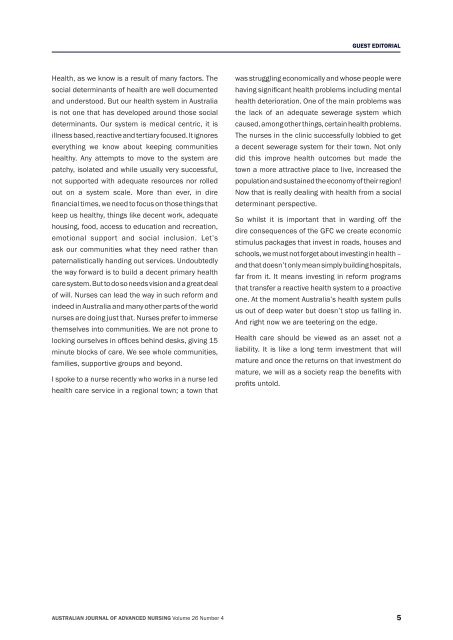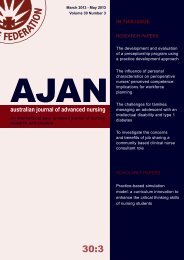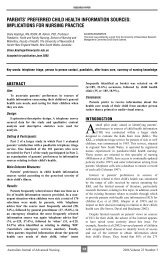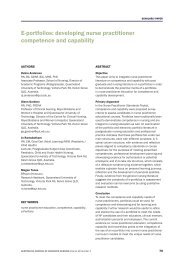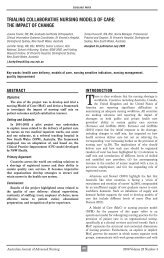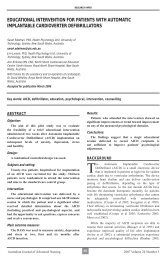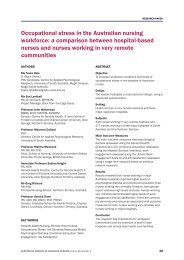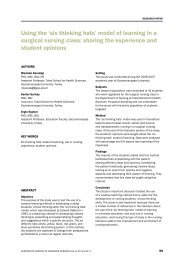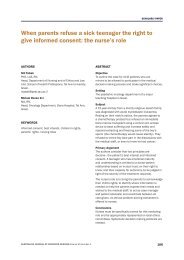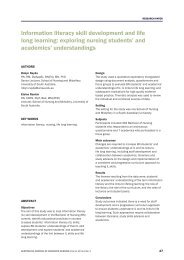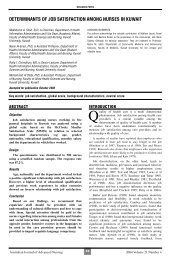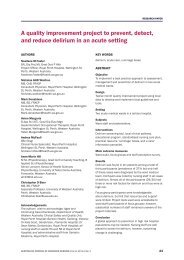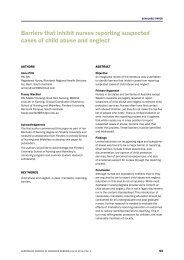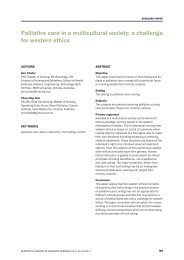australian journal of advanced nursing
australian journal of advanced nursing
australian journal of advanced nursing
Create successful ePaper yourself
Turn your PDF publications into a flip-book with our unique Google optimized e-Paper software.
Health, as we know is a result <strong>of</strong> many factors. The<br />
social determinants <strong>of</strong> health are well documented<br />
and understood. But our health system in Australia<br />
is not one that has developed around those social<br />
determinants. Our system is medical centric, it is<br />
illness based, reactive and tertiary focused. It ignores<br />
everything we know about keeping communities<br />
healthy. Any attempts to move to the system are<br />
patchy, isolated and while usually very successful,<br />
not supported with adequate resources nor rolled<br />
out on a system scale. More than ever, in dire<br />
financial times, we need to focus on those things that<br />
keep us healthy, things like decent work, adequate<br />
housing, food, access to education and recreation,<br />
emotional support and social inclusion. Let’s<br />
ask our communities what they need rather than<br />
paternalistically handing out services. Undoubtedly<br />
the way forward is to build a decent primary health<br />
care system. But to do so needs vision and a great deal<br />
<strong>of</strong> will. Nurses can lead the way in such reform and<br />
indeed in Australia and many other parts <strong>of</strong> the world<br />
nurses are doing just that. Nurses prefer to immerse<br />
themselves into communities. We are not prone to<br />
locking ourselves in <strong>of</strong>fices behind desks, giving 15<br />
minute blocks <strong>of</strong> care. We see whole communities,<br />
families, supportive groups and beyond.<br />
I spoke to a nurse recently who works in a nurse led<br />
health care service in a regional town; a town that<br />
was struggling economically and whose people were<br />
having significant health problems including mental<br />
health deterioration. One <strong>of</strong> the main problems was<br />
the lack <strong>of</strong> an adequate sewerage system which<br />
caused, among other things, certain health problems.<br />
The nurses in the clinic successfully lobbied to get<br />
a decent sewerage system for their town. Not only<br />
did this improve health outcomes but made the<br />
town a more attractive place to live, increased the<br />
population and sustained the economy <strong>of</strong> their region!<br />
Now that is really dealing with health from a social<br />
determinant perspective.<br />
So whilst it is important that in warding <strong>of</strong>f the<br />
dire consequences <strong>of</strong> the GFC we create economic<br />
stimulus packages that invest in roads, houses and<br />
schools, we must not forget about investing in health –<br />
and that doesn’t only mean simply building hospitals,<br />
far from it. It means investing in reform programs<br />
that transfer a reactive health system to a proactive<br />
one. At the moment Australia’s health system pulls<br />
us out <strong>of</strong> deep water but doesn’t stop us falling in.<br />
And right now we are teetering on the edge.<br />
Health care should be viewed as an asset not a<br />
liability. It is like a long term investment that will<br />
mature and once the returns on that investment do<br />
mature, we will as a society reap the benefits with<br />
pr<strong>of</strong>its untold.<br />
GUEST EDITORIAL<br />
AUSTRALIAN JOURNAL OF ADVANCED NURSING Volume 26 Number 4 5


